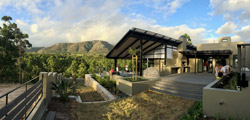One of South Africa’s most unique off-grid homes, a model for future sustainable living, has been hailed at a global conference in the UK where a paper on its development has been named as the best piece of research.
 The study of the unique off-grid eco-home, House Rhino at Crossways Farm Village outside Port Elizabeth, was compiled by two Nelson Mandela Metropolitan University (NMMU) academics and presented to delegates from around the world gathered at the prestigious UK sustainability conference.
The study of the unique off-grid eco-home, House Rhino at Crossways Farm Village outside Port Elizabeth, was compiled by two Nelson Mandela Metropolitan University (NMMU) academics and presented to delegates from around the world gathered at the prestigious UK sustainability conference.African Energy-Plus construction: A case study of House Rhino received the Chair’s Award at the recent [Sep 17th and 18th] Sustainable Ecological Engineering Design for Society (SEEDS) international conference at Leeds Beckett University in the UK.
The study of the unique off-grid eco-home, House Rhino at Crossways Farm Village outside Port Elizabeth, was compiled by two Nelson Mandela Metropolitan University (NMMU) academics and presented to delegates from around the world gathered at the prestigious UK sustainability conference.
The research report by NMMU Department of Construction Management academics Chris Allen and Katharina Crafford reinforces the growing call for housing developments worldwide to incorporate sustainable, “energy-plus” homes.
House Rhino is unique to South Africa and, according to Allen, one of about 50 globally to incorporate unique water and energy-centric eco-building solutions, making it an energy-plus home. Energy-plus homes make use of energy efficient appliances while producing more energy from renewable energy sources attached to the home than is used from external sources, such as the electricity grid, according to Wikipedia.
“Due to the energy crisis that South Africa has experienced over the past seven years, challenging preconceived ideas by creating attractive, affordable, energy efficient buildings has become critical to offsetting massive cost increases for electricity whilst providing a proof of concept project that professionals can reference,” reads the research report.
Allen has returned to NMMU ecstatic following the symposium where he presented the study to his academic peers.
“The Chair’s Award is the pick by chairperson for the conference, Prof. Chris Gorse, for the best paper at the conference. Awards were also given in a variety of other categories linked to the various themes,” explained Allen.
“It is obviously significant that from his [Gorse’s] perspective, he believed that it was the best paper at the conference – I would suggest from a new knowledge perspective. He subsequently discussed with me the possibility of incorporating the paper in an international journal, as well as the possibility of a book incorporating it alongside other research from around the world of a similar nature.”
Brian van Niekerk, House Rhino developer and MD of the sustainable solutions company behind the project, Rhino Group, says the acceptance of the research showed a shift in the global mind-set towards the benefits of eco-wise building.
“In 2012 we took all our products and integrated them into developing House Rhino,” says Van Niekerk. “This gave us the opportunity to build and integrate the unique off-grid solutions at the house, and at the same time expand our understanding into a number of new products and services.”
The paper’s abstract reads: “This paper reports on a case study of an energy-plus residential building in South Africa, one of the first of this project type on the African continent. House Rhino … provided an unprecedented opportunity to research the potential for a residential energy-plus building as a proof of concept for a future where energy and water are rare commodities. House Rhino combines active and passive features in a modern residential design that has been created as a living lab.”
The paper also notes: “Findings include that an energy-plus building can be constructed in a warm climate environment at a competitive price … The results of the research suggest that although the benefits of sustainable construction are well known, the ability to create viable energy-plus buildings using alternative construction techniques can now be proven in a warm climate environment.”








